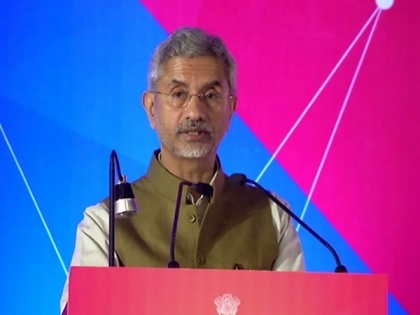India seeks to be leader in Climate Change Action: Jaishankar
By ANI | Published: October 7, 2019 05:38 PM2019-10-07T17:38:23+5:302019-10-07T18:00:02+5:30
India seeks to be a leader in the Climate Change Action, as mfested by its initiatives towards reducing fossil fuel dependency and emissions, External Affairs Minister S Jaishankar said here on Monday, adding that New Delhi would not limit these efforts to its own soil only.

India seeks to be leader in Climate Change Action: Jaishankar
India seeks to be a leader in the Climate Change Action, as mfested by its initiatives towards reducing fossil fuel dependency and emissions, External Affairs Minister S Jaishankar said here on Monday, adding that New Delhi would not limit these efforts to its own soil only.
Delivering a keynote address on the occasion of the completion of 55 years of Indian Technical and Economic Cooperation (ITEC) programme, Jaishankar said: "India seeks to be the leader in Climate Change Action. India's initiative of the International Solar Alliance led by the vision of Prime Minister Narendra Modi is a testimony to the fact that we are committed to a clean and sustainable future for the children of tomorrow. We are fast moving towards the use of clean technologies and e-vehicles for the reduction of fossil fuel dependency and emissions."
Jaishankar noted that the country has the fastest-growing solar energy programme in the world, and has set a target of production of 175 gigawatts (GW) of renewable energy as part of the Solar Alliance Initiative and its integration in the main power grid, which are "well on its way to be achieved."
He said that the significance of these achievements lies in the fact that India does not limit its efforts towards climate change action to its soil."Much of our development assistance, particularly capacity building through ITEC is geared around training and projects in solar technologies and other renewables in Africa, Caribbean and Pacific island countries."
The Minister noted that the development cooperation has always played a central role in India's foreign policy and its relations with partner countries are based on the principles of equality, mutual respect for sovereignty and freedom of action and choice.
"It is not based on competition, conditionalities or prescriptions. It stems from the spirit of solidarity to enhance mutual learning for shared and sustainable growth. These are also the cornerstones in our capacity building initiatives which span from Latin American countries to Pacific Island countries, as we traverse similar paths of development," he said.
Recounting the challenges of population resource imbalances, rising inequities, and climate change, among others faced by the developing countries today, the minister said that India is committed to facing these challenges by expanding its "partnership choices in foreign cooperation and (by) resolving to collaborate more closely to press ahead with our SDGs (Sustainable Development Goals)."
"Thus, in its own modest way, India has also tried to step-up the material resources and enabling mechsms, especially in the past one decade in sharing of our development experience with the rest of the world," he said.
Some of the steps taken by the MEA in this regard include the setting up of the Development Partnership Administration Division as a dedicated agency within MEA, enhancement of budget allocations for partner countries, increase in the size of the Foreign Service, including the hiring of subject matter experts, increasing number of scholarships.
"Moreover, in all the recent development co-operation initiatives, capacity building has been a central theme. Several announcements for enhancement of ITEC training slots have been made during the recent bilateral visits and also at the various multilateral engagements such as the Bay of Bengal Initiative for Multi-Sectoral Technical and Economic Cooperation (BIMSTEC), Association of South East Asian Nations (ASEAN), IAFS-III, Caribbean Community (CARICOM), FIPIC- to name a few," he said.
He said that such capacity-building efforts by India are in line with the country's neighborhood first policy. "This is of course not to undermine our efforts of co-operation with our other regional partners which are equally valuable and unique," he said.
Jaishankar said that India is acutely aware of the role of affordable and quality healthcare, professional skills and higher education as determinants of human development.
The minister said he is "delighted to have launched" the e-Vidya Bharti and e-Arogya Bharti, tele-education and tele-medicine project for Africa, "which is one of the largest projects being executed by Ministry.
"This project will enable African students to access premier Indian education through the comforts of their homes and offer Indian medical expertise to African doctors and patients alike," added Jaishankar.
( With inputs from ANI )
Open in app